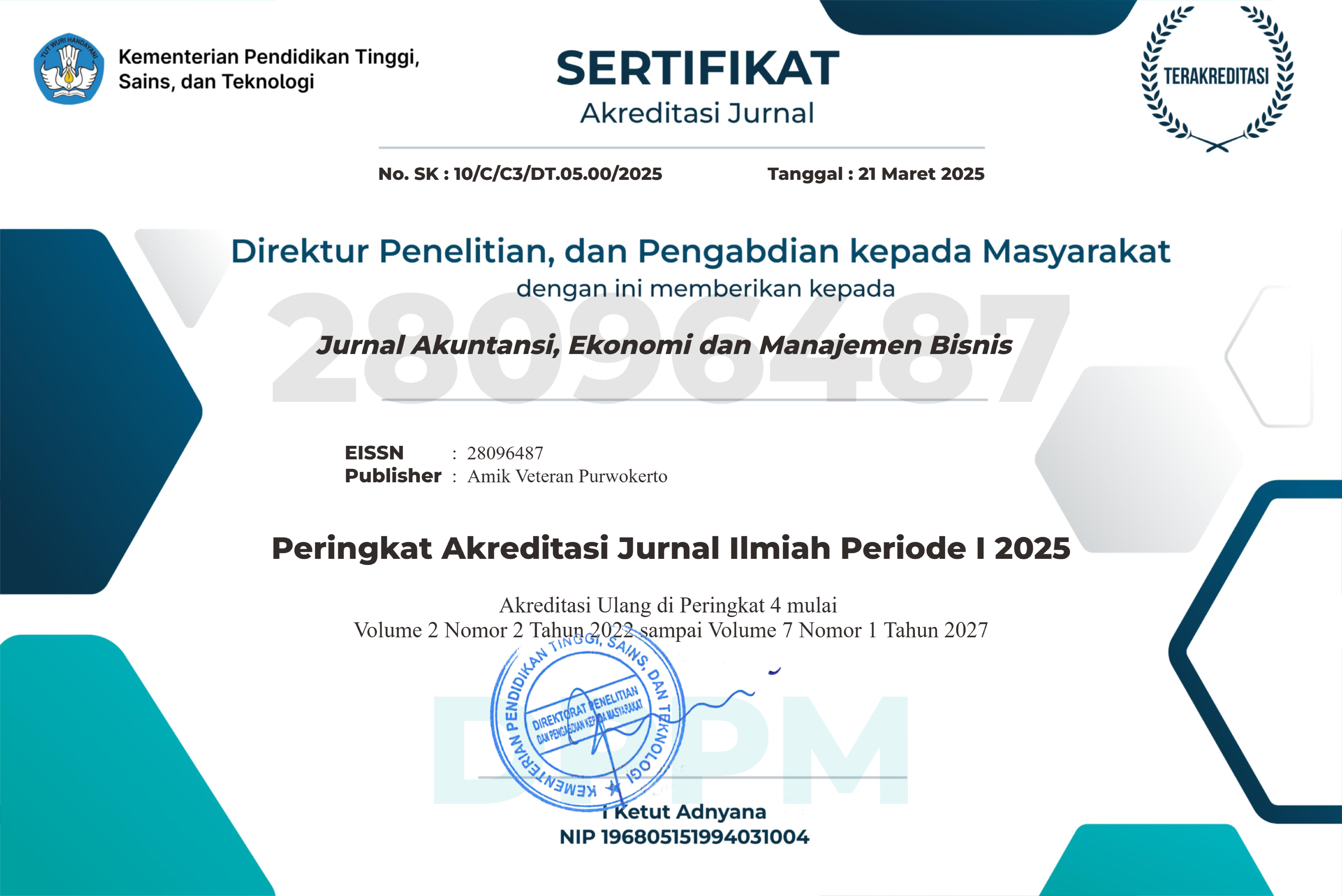EFEKTIVITAS PELATIHAN BERBASIS KOMPETENSI DITINJAU DARI ASPEK REAKSI DAN PROSES PEMBELAJARAN (STUDI PADA KARYAWAN KALLA GROUP, INDONESIA)
DOI:
https://doi.org/10.55606/jaem.v1i3.63Keywords:
efektivitas, pelatihan, kompetensi, kalla group.Abstract
ABSTRACT
The transfer of knowledge and skills through training activities is one of the important aspects that is highly considered. As one of the largest group companies in eastern Indonesia that is experiencing rapid business growth, Kalla Group is very concerned about the capabilities of its human resources in carrying out business and cultural transformation. This is indicated by the implementation of HR development to improve the competence of the Kalla Group's HR through the Training of Trainer (TOT) activities. This research was conducted to see the effectiveness of the Competency-Based TOT training in terms of reactions and learning processes. This research was conducted with quantitative methods in the form of descriptive research. The object of this research is the evaluation of the training of the 25 participants of the Kalla Group Competency-Based TOT training. The training evaluation uses the Kirkpatrick Level 1 and Level 2 models to evaluate the training on the aspects of the reaction and learning of the trainees. The results showed that the reaction of the training participants showed a very good category towards the trainers and organizing activities. In addition, the trainees experienced an increase in competence by comparing the test result data before and after the training.
Keywords: effectiveness, training, competence, Kalla group.
ABSTRAK
Transfer pengetahuan dan keterampilan melalui kegiatan pelatihan adalah salah satu aspek penting yang sangat diperhatikan bagi pengembangan SDM. Sebagai salah satu grup perusahaan terbesar di kawasan timur Indonesia yang mengalami pertumbuhan bisnis yang begitu pesat, Kalla Group sangat peduli terhadap kemampuan SDM yang dimilikinya dalam melakukan transformasi bisnis dan budaya. Hal ini ditunjukkan dengan pelaksanaan pengembangan SDM untuk meningkatkan kompetensi SDM Kalla Group melalui kegiatan Training of Trainer (TOT). Penelitian ini dilakukan untuk melihat efektivitas pelaksanaan pelatihan TOT Berbasis Kompetensi ditinjau dari aspek reaksi dan proses pembelajaran. Penelitian ini dilakukan dengan metode kuantitatif dengan bentuk penelitian deskriptif. Objek penelitian ini adalah evaluasi pelatihan pada peserta pelatihan TOT Berbasis Kompetensi Kalla Group yang berjumlah 25 peserta. Evaluasi pelatihan menggunakan model Kirkpatrick Level 1 dan Level 2 untuk mengevaluasi pelatihan pada aspek reaksi dan pembelajaran peserta pelatihan. Hasil penelitian menunjukkan bahwa reaksi peserta pelatihan menunjukkan kategori sangat baik terhadap para pelatih dan penyelenggaran kegiatan. Selain itu, peserta pelatihan mengalami peningkatkan kompetensi dengan membandingkan data hasil tes sebelum pelatihan dan setelah pelatihan.
Kata Kunci: efektivitas, pelatihan, kompetensi, kalla group.
References
Spencer, S. M., & Lyle M. Spencer, J. Competence at Work: Models for Superior Performance. John Wiley & Sons, Inc, 1993, pp. 35-37
Kirkpatrick, D. L., & Kirkpatrick, J. D. Evaluating Training Programs, The Four Levels.Third Edition. Berrett-Koehler Publishers. 2009
Jusuf, I. Prinsip-Prinsip Dasar Manajemen Pelatihan (Dari Analisis Kebutuhan Sampai Evaluasi Program Pelatihan). Insani Cendekia. 2001
Utomo, A., & Priskila, K. Evaluasi Pelatihan dengan Metode Kirkpatrick Analysis. Jurnal Telematika. 9(2), 2014. 37–41
Hariandja, M. T. E. Manajemen Sumber Daya Manusia: Pengadaan, Pengembangan, Pengkompensasian, dan Peningkatan Produktivitas Pegawai. PT. Grasindo. 2002
Handoko, T. H. Manajemen Sumber Daya Manusia (Edisi Pert). BPFE. 2005
Mathis, R. ., & J. H., J. Human Resource Management (13th ed.). South-Western Cengage Learning. 2011
Rivai, V., & Sagala, E. J. Manajemen Sumber Daya Manusia untuk Perusahaan. Rajagrafindo Persada. 2009
Masneldy. Pentingnya Training Karyawan bagi Suatu Perusahaan. HIPOTESA, V(16). 2008
Bariqi, M. D. Pelatihan Dan Pengembangan Sumber Daya Manusia. Jurnal Studi Manajemen Dan Bisnis, Volume 5(2), 2018, Page 64–69. https://doi.org/10.21107/jsmb.v5i2.6654
Phillips, J. J. Handbook of Training Evaluation and Measurement Methods. In Handbook of Training Evaluation and Measurement Methods. 2012. https://doi.org/10.4324/9780080572659
Angisna, T. Evaluasi Efektivitas Pelatihan Kampung KB di Perwakilan BKKBN Provinsi Jawa Timur. Jurnal PROMKES, Volume 6(1), 2018, Page 93. https://doi.org/10.20473/jpk.V6.I1.2018.93-104
Kirkpatrick, D. L., & Kirkpatrick, J. D. Evaluating Training Programs, The Four Levels.Third Edition. Berrett-Koehler Publishers. 2009
Kurniawan, A. W., & Puspitaningtyas, Z, Metode Penelitian Kuantitatif. Pandiva Buku. 2016
Noe, R. A., Hollenbeck, J. R., Gerhart, B., & Wright, P. M.Human Resource Management. McGraw-Hill Education. 2002
Brewer, E. W., & Burgess, D. N. Professor’s Role in Motivating Students to Attend Class. Journal of Industrial Teacher Education, 42(23). 2005.
Eldyani, P., & Wardoyo, P. Upaya Peningkatan Kompetensi: Dampak Pelatihan Bersubsidi Serta Peran Instruktur. Jurnal Riset Ekonomi Dan Bisnis, Volume 11(2), 2018. Pages 142-145. https://doi.org/10.26623/jreb.v11i2.1082
Downloads
Published
How to Cite
Issue
Section
License
Copyright (c) 2021 Jurnal Akuntansi, Ekonomi dan Manajemen Bisnis

This work is licensed under a Creative Commons Attribution 4.0 International License.








